|
|
|
Sort Order |
|
|
|
Items / Page
|
|
|
|
|
|
|
| Srl | Item |
| 1 |
ID:
127076
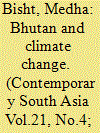

|
|
|
|
|
| Publication |
2013.
|
| Summary/Abstract |
The paper seeks to understand Bhutan's climate diplomacy and to identify the strategic implications of climate change for Bhutan. The implications are scaled at the national and the regional levels. The impact of climate change is studied within the broader analytical framework of the threats posed and the opportunities offered to Bhutan in the context of regional politics. The main argument is that India-Bhutan cooperation on climate change needs to be synchronized with the co-benefit approach, which India has been articulating at the national level. This approach, it is argued, will go a long way towards evolving a 'nuanced' approach in contemporary environmental diplomacy.
|
|
|
|
|
|
|
|
|
|
|
|
|
|
|
|
| 2 |
ID:
112807
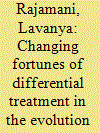

|
|
|
|
|
| Publication |
2012.
|
| Summary/Abstract |
This article traces the evolution of international environmental law and dialogue in the four decades from Stockholm, 1972, to Rio+20, 2012, with a focus on the changing dynamics of the discourse between developed and developing countries, and the corresponding interpretational shifts in the application of differential treatment in international environmental law-climate change law in particular. This article argues that in the first three decades of environmental diplomacy, from 1972 to 2002, the international community witnessed an exponential growth in the number and range of multilateral environmental agreements, an array of tools, techniques and practices, and a rapid expansion of differential treatment in favour of developing countries. Differential treatment in central obligations, albeit disputed from its inception, found pride of place in the Kyoto Protocol negotiated in 1997. The decade that followed, 2002 to 2012, witnessed heightened popular and political mobilization around the climate change issue. But, in response to seemingly intractable difficulties across the North-South and North-North spectrum, it was accompanied by a retreat from differential treatment in central obligations. The battle over the future (or lack thereof) of the Kyoto Protocol, and the recent developments in the climate regime-in particular the 2011 Durban Platform Decision-testify to this retreat from certain variants of differential treatment, and interpretations of equity and common but differentiated responsibilities. An analysis of these developments and the politics that gave rise to them, reveal that while the international regime can survive the erosion of certain limited forms of differential treatment, a wholesale rejection of differential treatment, and of the 'equity' concerns that animate it, would destabilize the normative core of the regime as well as render the climate regime unattractive to key players like India.
|
|
|
|
|
|
|
|
|
|
|
|
|
|
|
|
| 3 |
ID:
192959
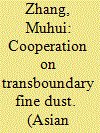

|
|
|
|
|
| Summary/Abstract |
In this article, I investigate Korea's prudential environmental diplomacy with China regarding transboundary fine dust pollution from the perspective of Korea's disadvantageous position vis-à-vis China due to the ambiguity of pollution responsibilities and geopolitical constraints. Against this backdrop, Korea has tactically exercised prudential environmental diplomacy toward China in dual tracks. First, it has taken a "high-profile" stance in engaging with and socializing China into bilateral and multilateral frameworks and endeavors to align its environmental interests with those of China via scientific and technological cooperation. Second, Korea has undertaken a cautious procedure and is not pressuring China by pursuing legal-binding approaches immediately. I see a "mixed success" of Korea's environmental engagement with China and appraise Korea's policy flexibility and pragmatism.
|
|
|
|
|
|
|
|
|
|
|
|
|
|
|
|
| 4 |
ID:
118717
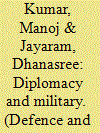

|
|
|
| 5 |
ID:
178327
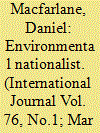

|
|
|
|
|
| Summary/Abstract |
Prior to 1945, General Andrew George Latta McNaughton had already made a name for himself as an army general, engineer, inventor, and cabinet minister. After 1945, McNaughton occupied a number of key international roles for Canada: at the United Nations, on the Permanent Joint Board on Defence, and on the International Joint Commission. Even though he became one of Canada’s most important diplomatic actors during the early Cold War period, this aspect of his career has been mostly ignored by international historians. This article examines McNaughton’s key involvement in the evolution of a number of Canada–US water megaprojects, arguing that his nationalism underpinned his approach to bilateral relations, which combined deep technical expertise with a willingness to publicly assert the Canadian national interest. McNaughton’s approach should be studied not only to better understand North American environmental diplomacy in the Cold War but also to draw from it several lessons for contemporary times.
|
|
|
|
|
|
|
|
|
|
|
|
|
|
|
|
| 6 |
ID:
124074
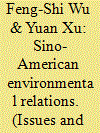

|
|
|
|
|
| Publication |
2013.
|
| Summary/Abstract |
This paper applies two dimensions, inter-governmental and trans-societal, to discuss US-China environmental relations. It argues that, while official bilateral environmental relations between the two over the past 15 years have not yet achieved substantial outcomes, trans-societal linkages between American and Chinese NGOs and activists have grown steadily. The scope and volume of their work may not be as visible as that of ODA projects or official initiatives, but their impact may be more sustainable and not easily interrupted by administrative or regime shifts in either country. On the other hand, this paper highlights that US-China relations in regard to climate change will explain the main trends that will dominate the overall environmental cooperation in the coming years. Whether or not the governments can build up mutual trust and effective mechanisms in security, trade and other policy fields will affect the possibility of a conducive atmosphere for cooperation in environmental protection.
|
|
|
|
|
|
|
|
|
|
|
|
|
|
|
|
|
|
|
|
|